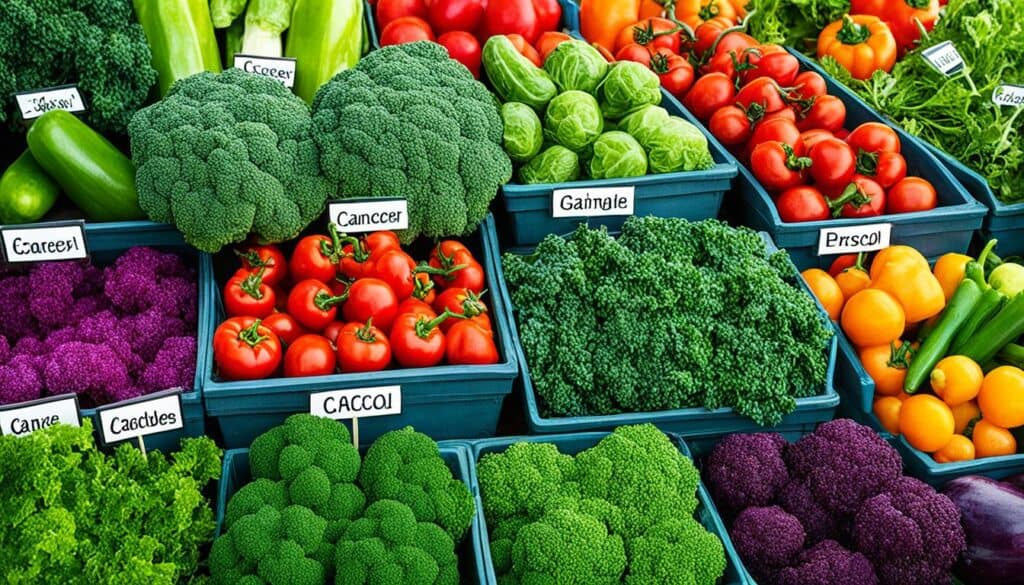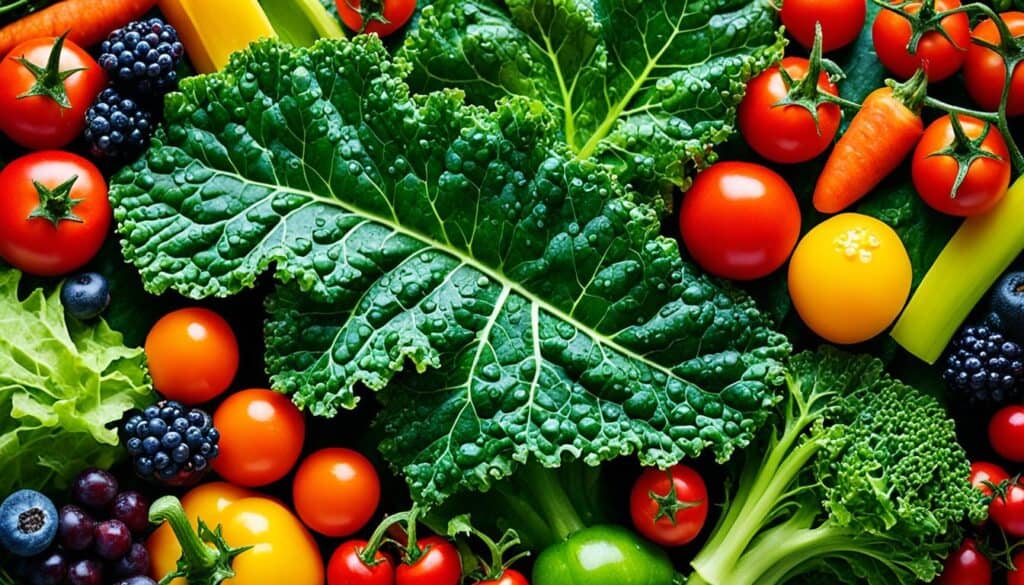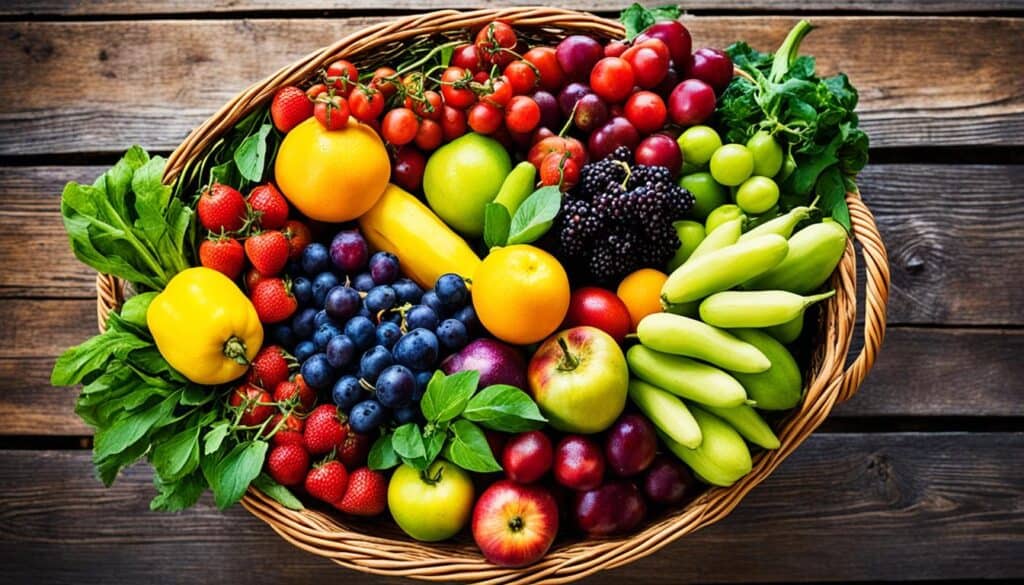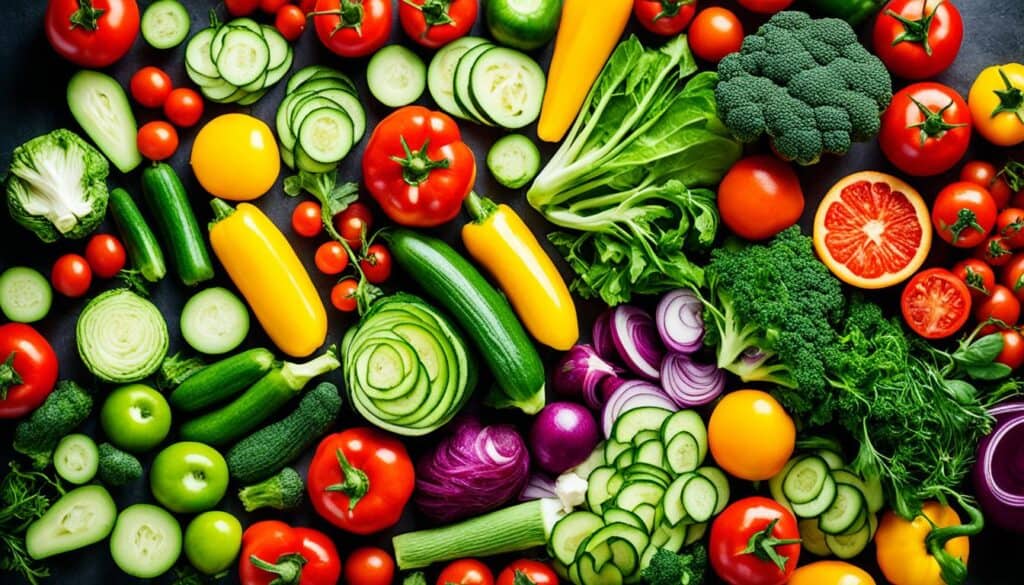Did you know that incorporating fresh vegetables into your daily diet can have a significant impact on your overall health? In fact, studies have shown that people who consume a diet rich in fresh vegetables are less likely to develop chronic diseases and maintain a healthier weight compared to those who don’t.
Fresh vegetables are not only delicious but also packed with essential nutrients that can support your well-being. From vitamins and minerals to fiber and antioxidants, these nutritious veggies provide a wide range of benefits for your body and mind.
Key Takeaways:
- Incorporating fresh vegetables into your diet can significantly improve your overall health and well-being.
- A diet rich in vegetables can help prevent chronic diseases and maintain a healthy weight.
- Fresh vegetables are packed with essential nutrients, including vitamins, minerals, fiber, and antioxidants.
- By choosing fresh, seasonal vegetables, you can enjoy optimal flavor and nutritional value.
- Experiment with different recipes and cooking methods to make eating fresh vegetables enjoyable and exciting.
Benefits of Eating Fresh Vegetables
Eating fresh vegetables offers a multitude of benefits that contribute to a healthy and sustainable lifestyle. Whether it’s choosing organic produce, embracing farm-to-table practices, indulging in seasonal vegetables, or enjoying farm-fresh produce, there are numerous reasons to prioritize these nutritious options in your diet.
- Organic Produce: Opting for organic vegetables ensures that you’re consuming food that is free from harmful synthetic fertilizers and pesticides. By choosing organic, you’re reducing your exposure to potentially harmful chemicals, promoting better health and well-being.
- Farm-to-Table: Farm-to-table practices emphasize the importance of supporting local farmers and consuming produce that is harvested at its peak freshness and flavor. When vegetables are sourced directly from local farms, they maintain their nutritional integrity and taste, offering you the best possible flavor and nourishment.
- Seasonal Vegetables: Incorporating seasonal vegetables into your meals adds variety to your diet and allows you to enjoy an array of flavors and textures all year round. Seasonal produce is celebrated for its impeccable taste and freshness, making each bite a delightful culinary experience.
- Farm-Fresh Produce: When it comes to nutritional value, farm-fresh vegetables are hard to beat. By reducing the time between harvest and consumption, these vegetables retain their optimal nutrients, providing you with essential vitamins, minerals, and antioxidants that support your overall health.
Nutritional Value of Fresh Vegetables
Fresh vegetables offer a wealth of essential nutrients that contribute to a healthy diet. Packed with fiber, vitamins, and minerals, these garden-fresh vegetables provide numerous health benefits and support overall wellbeing. Dark-green vegetables like kale, spinach, and broccoli are particularly nutritious, containing ample amounts of vitamins A, C, and K, as well as iron and calcium. They are excellent options for incorporating fresh greens into your meals.
Raw leafy greens, such as lettuce and arugula, are also rich sources of vitamins and antioxidants. They add a refreshing crunch to salads and sandwiches while providing a nutritional boost. Other vegetables like cucumbers and bell peppers are great additions to your plate, delivering vitamins and antioxidants that promote a strong immune system and protect against cell damage.
By including fresh greens and garden-fresh vegetables in your diet, you can reap the rewards of their powerful nutritional value. They not only enhance the flavor and texture of your meals but also nourish your body with the essential building blocks it needs to thrive.
Eating Fresh Vegetables for Heart Health
When it comes to cardiovascular health, fresh vegetables play a crucial role in reducing the risk of cardiovascular disease. Research has consistently shown that a diet rich in fruits and vegetables can have a positive impact on heart health.
Consuming a variety of fresh vegetables can help lower blood pressure, a key factor in preventing heart disease. Dark-green leafy vegetables such as spinach, kale, and Swiss chard are particularly beneficial. These nutrient-packed greens are rich in potassium, a mineral that helps regulate blood pressure and maintain healthy heart function.
Another group of vegetables that deserves attention for heart health is cruciferous vegetables. Broccoli, cauliflower, Brussels sprouts, and cabbage are all members of this family and have been associated with a decreased risk of cardiovascular disease. These vegetables are high in fiber, antioxidants, and other heart-healthy compounds that can contribute to overall cardiovascular well-being.
| Vegetable | Beneficial Nutrients |
|---|---|
| Spinach | Iron, calcium, vitamins A, C, and K |
| Kale | Vitamins A, C, and K, calcium |
| Swiss Chard | Vitamins A, C, and K, iron, magnesium |
| Broccoli | Fiber, vitamins C and K, folate |
| Cauliflower | Fiber, vitamins C, K, and B-6, folate |
| Brussels Sprouts | Fiber, vitamins C, K, and B-6 |
| Cabbage | Fiber, vitamins C and K |
Incorporating these heart-healthy vegetables into your diet can help provide essential nutrients while reducing the risk of cardiovascular disease. To reap the benefits, aim for a variety of fresh vegetables, including leafy greens and cruciferous options, in your daily meals.
By making fresh vegetables a staple in your diet, you can take proactive steps towards maintaining a healthy heart and reducing the chances of a heart attack or stroke.
Fresh Vegetables and Cancer Prevention
When it comes to cancer prevention, the role of fruits and vegetables is multifaceted. While the relationship between these nutrient-rich foods and cancer prevention is complex, studies indicate that incorporating certain types of fresh vegetables into your diet may offer protection against specific cancers.
Green leafy vegetables like lettuce, spinach, and kale have been linked to a reduced risk of breast cancer. These vibrant greens are packed with antioxidants and phytochemicals that have shown potential in inhibiting the growth of cancer cells.
Tomatoes, rich in lycopene, an antioxidant with powerful anti-cancer properties, may help protect against prostate cancer. Research suggests that regularly consuming tomatoes or tomato products can reduce the risk of developing this common cancer in men.
To further explore the potential protective effects of fresh vegetables against cancer, ongoing research is being conducted to unravel the intricate mechanisms that contribute to such outcomes.
“Let food be thy medicine and medicine be thy food.” – Hippocrates
While fresh vegetables can play a role in cancer prevention, it’s important to remember that they are just one piece of the puzzle. It’s crucial to adopt a well-rounded, balanced diet that encompasses a variety of nutrient-dense foods for optimal health and disease prevention.
Key Takeaways: Fresh Vegetables and Cancer Prevention
- Some fresh vegetables may offer protection against certain cancers.
- Green leafy vegetables like lettuce, spinach, and kale are associated with a reduced risk of breast cancer.
- Tomatoes, rich in lycopene, may help protect against prostate cancer.
- A balanced and diverse diet is crucial for overall health and disease prevention.
By incorporating a colorful array of fresh vegetables into your meals, you can avail yourself of their potential cancer-fighting properties while enjoying the delicious flavors and textures they bring to your plate.
Fresh Vegetables for Blood Sugar Control
Including fresh vegetables in your diet is a smart choice for managing blood sugar levels, especially if you have diabetes or are at risk of developing the condition. These nutrient-rich foods can help prevent blood sugar spikes and promote better blood sugar control, allowing you to maintain stable levels throughout the day.
Fresh vegetables, such as leafy greens, cruciferous vegetables, and non-starchy options, have lower glycemic loads compared to processed foods and sugary snacks. This means that they have a milder impact on blood sugar, preventing drastic fluctuations that can be detrimental to your health.
When it comes to managing diabetes, one of the key considerations is choosing foods that are low in carbohydrates. Non-starchy vegetables like broccoli, cauliflower, bell peppers, and zucchini fit this criteria perfectly. They are packed with essential nutrients and fiber while containing minimal amounts of carbs. As a result, they have little effect on blood sugar levels, making them an excellent addition to your meals.
Leafy green vegetables, such as spinach, kale, and Swiss chard, are also highly beneficial for blood sugar control. They are rich in vitamins, minerals, and antioxidants, while being low in calories and carbohydrates. Incorporating these vegetables into your diet can help improve insulin sensitivity, reduce inflammation, and support overall metabolic health.
Additionally, fresh vegetables are an excellent source of dietary fiber, which plays a crucial role in blood sugar management. Fiber helps slow down the absorption of glucose into the bloodstream, preventing sharp spikes in blood sugar levels. It also contributes to satiety and promotes a healthy digestive system.
By focusing on fresh vegetables and incorporating them into your meals, you can take control of your blood sugar levels and improve your overall well-being. Whether you enjoy them raw in salads, steamed as a side dish, or stir-fried in a flavorful stir-fry, the versatility of fresh vegetables allows for endless culinary possibilities.
Tips for Blood Sugar-Friendly Vegetable Choices:
- Choose a variety of colorful vegetables to ensure a diverse nutrient intake.
- Opt for non-starchy vegetables like broccoli, spinach, cauliflower, and bell peppers.
- Include leafy greens such as kale, Swiss chard, and collard greens.
- Experiment with different cooking methods like roasting, grilling, or sautéing to enhance flavors.
- Avoid adding high-sugar dressings or sauces to your vegetable dishes.
Incorporating fresh vegetables into your diet can be a delicious and effective way to manage blood sugar levels. By making these nutrient-packed foods a priority, you can support your overall health while enjoying a wide range of flavors and textures on your plate.
| Vegetable | Glycemic Index | Serving Size (1 cup) |
|---|---|---|
| Broccoli | 10 | 55g |
| Spinach | 15 | 30g |
| Cauliflower | 15 | 100g |
| Bell Peppers | 15 | 92g |
| Zucchini | 15 | 180g |
The Importance of Eating Seasonally
Eating seasonally offers a multitude of benefits for both our health and the environment. When we choose to consume in-season produce, we are not only treated to fresher and tastier flavors, but we also reap the rewards of enhanced nutritional value. It’s a win-win situation that supports local farmers and reduces the carbon footprint associated with long-distance transportation.
One of the easiest ways to access in-season produce is by shopping at local farmer’s markets or joining a community-supported agriculture (CSA) program. These options provide a direct connection to the farmers, ensuring that you’re getting the freshest seasonal vegetables while supporting the local economy.
By opting for in-season produce, we unlock a world of culinary possibilities. We can experiment with unique flavors and textures that are only available during certain times of the year, encouraging us to embrace variety in our meals. From vibrant summer berries to hearty fall squashes, there’s always something new and exciting to try.
“Eating seasonally allows us to reconnect with nature’s rhythm and appreciate the bountiful offerings of each season.” –
Irene Simmons, Local Farm Advocate
Not only does eating seasonally benefit our taste buds and health, but it also supports sustainable agricultural practices. Local farmers often prioritize environmentally friendly methods, focusing on crop rotation, responsible water usage, and reducing reliance on synthetic fertilizers and pesticides. By choosing in-season produce from local farms, we actively contribute to the preservation of our natural resources.
Bringing the farm-to-table experience into our homes is a delightful way to celebrate the seasons and honor the hard work of local farmers. So, let’s embrace the beauty and abundance that each season brings, and savor the goodness of in-season produce that nourishes both body and soul.
Tips for Incorporating Fresh Vegetables into Your Diet
When it comes to healthy eating, fresh vegetables play a crucial role. They are packed with essential nutrients, vitamins, and minerals that are beneficial for our overall well-being. If you’re looking to incorporate more vegetables into your diet, here are some tips to get you started:
1. Experiment with Healthy Recipes
Trying out new recipes that feature a variety of vegetables is a great way to add more freshness and flavor to your meals. Explore different cuisines and cooking methods to discover exciting combinations and textures. From roasted vegetables with herbs to vegetable-packed stir-fries, there are endless possibilities to explore.
2. Plan Your Meals with Vegetables in Mind
Meal planning is an effective way to ensure you’re incorporating vegetables into your daily diet. When planning your meals, make it a point to include different types and colors of vegetables. This way, you’ll not only enhance the visual appeal of your plate but also benefit from the diverse range of nutrients each vegetable offers.
3. Embrace Different Cooking Methods
Don’t limit yourself to just one cooking method. Try steaming, sautéing, grilling, or even enjoying vegetables raw in salads. Each cooking method brings out unique flavors and textures, allowing you to discover new ways to enjoy your favorite vegetables.
4. Make Vegetables the Star
Instead of considering vegetables as side dishes, make them the centerpiece of your meals. Create hearty salads with a mix of greens, vegetables, beans, and grains. Whip up flavorful vegetable soups or stews that will satisfy your taste buds and keep you feeling nourished.
5. Join Online Communities for Inspiration
There are numerous online communities, blogs, and social media platforms dedicated to healthy recipes and meal inspirations. Joining these communities can provide you with a wealth of ideas and motivation to incorporate fresh vegetables into your everyday meals.
Incorporating fresh vegetables into your diet doesn’t have to be complicated or boring. By trying new recipes, planning your meals, exploring different cooking methods, and making vegetables the star of your dishes, you’ll not only enjoy the delicious flavors but also reap the incredible health benefits they offer.
Conclusion
Fresh vegetables play a crucial role in maintaining a healthy lifestyle. These nutritious veggies are packed with essential nutrients that support our overall well-being. By incorporating a variety of fresh vegetables into our diet, we can enjoy the benefits of farm-to-table goodness and embrace a nutritious way of eating.
Not only do fresh vegetables provide us with vitamins, minerals, and fiber, but they also offer protection against various diseases. Their natural goodness helps to reduce the risk of cardiovascular issues, such as heart attack or stroke. Additionally, certain vegetables have been linked to a decreased risk of cancer, making them a valuable addition to our diet.
When it comes to eating fresh vegetables, there are several options available. Whether you prefer to buy in-season produce from local farms or visit farmer’s markets, these choices ensure that you get the freshest and most flavorful vegetables possible. By planning your meals and trying out different cooking methods, you can easily incorporate fresh vegetables into your diet and enhance your healthy eating habits.
In summary, fresh vegetables are not only delicious but also offer a wide range of health benefits. They are a key component of a nutritious eating plan and help support our overall well-being. So, let’s make fresh vegetables a regular part of our meals and enjoy the goodness they bring to our plates and our bodies.










Leave a Reply